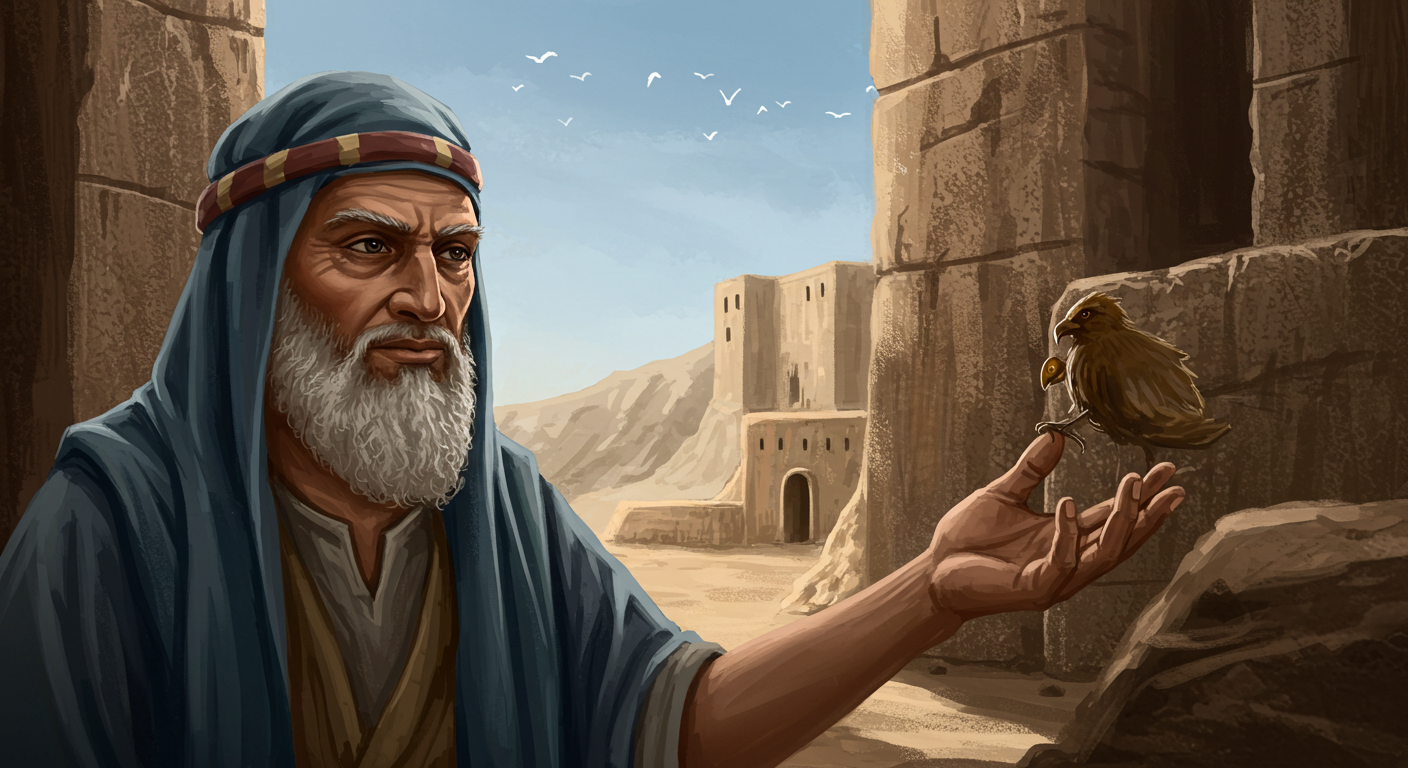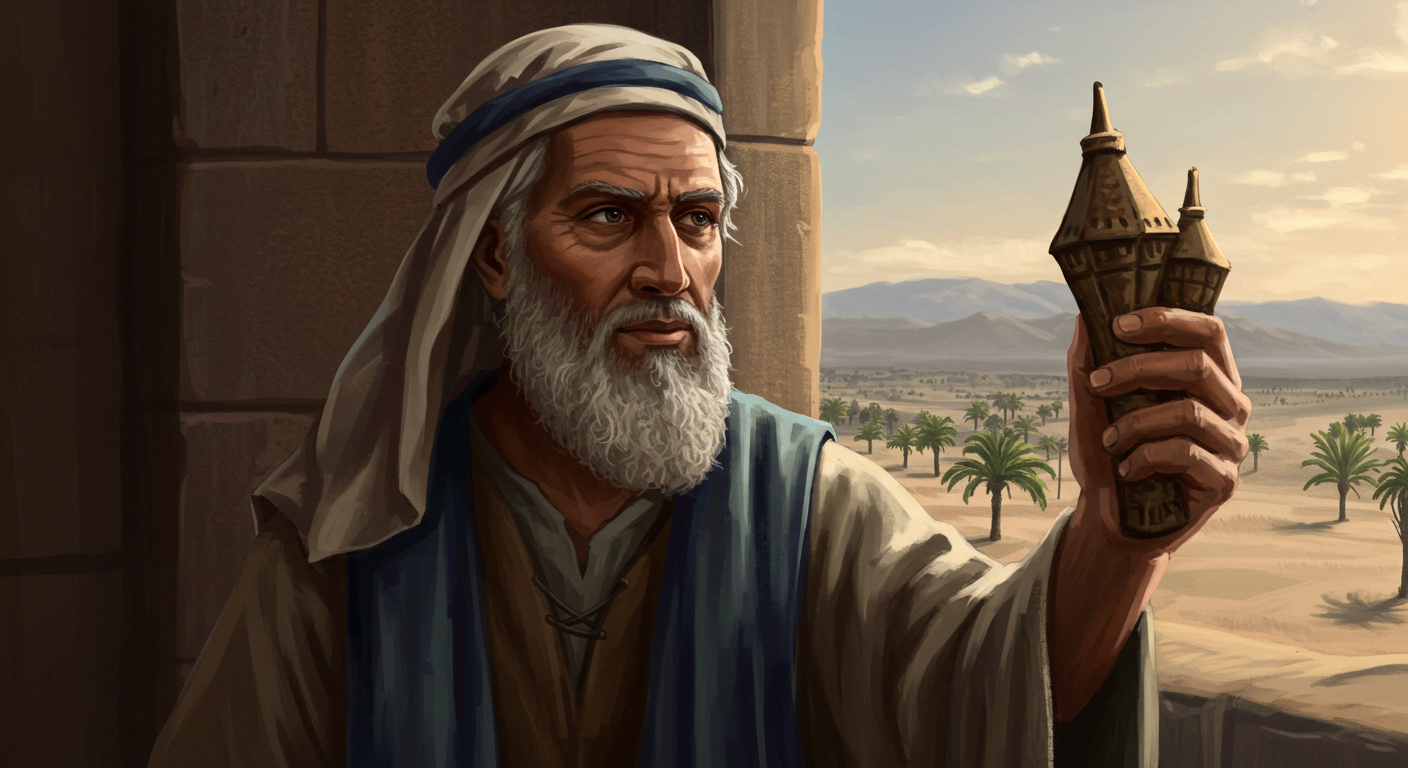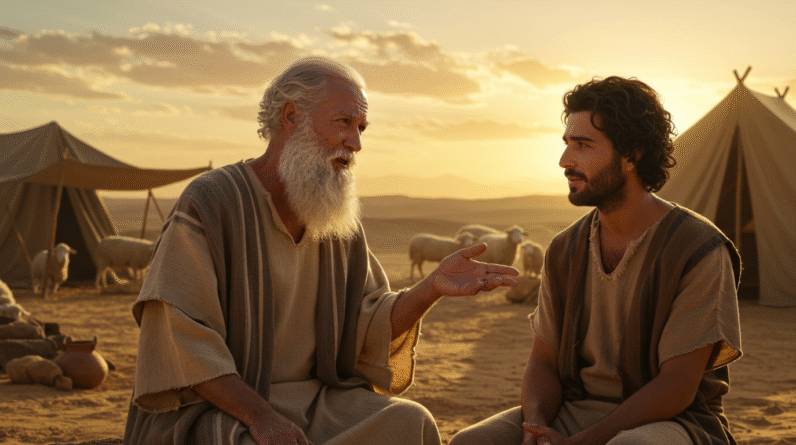Discover Shimei’s intricate role and journey toward redemption in the biblical narrative, exploring themes of mercy, justice, and transformation in human nature.

Introduction
Meet Shimei, an intriguing, often overlooked figure in the rich tapestry of biblical stories. He first comes into focus amidst a dramatic turning point in King David’s life, playing a role that seems small but ripples with significance. As David flees Jerusalem, escaping his son Absalom’s revolt, Shimei emerges from the shadows, cursing the king and casting stones, bringing to light themes of anger, retribution, and possibly redemption. Despite Shimei’s apparent irrelevance, his biblical narrative challenges readers to scrutinize concepts like forgiveness, justice, and the human tendency to seek revenge. Shimei is pivotal in reminding us that every story has the potential for transformation and deeper meaning. His interactions with David, and eventual fate under King Solomon, unfold a story that challenges the fabric of human character and divine mercy 2 Samuel 16:5-13, 1 Kings 2:8-9.
Shimei’s Story in the Bible
Shimei’s story begins during David’s turbulent days, filled with familial betrayal and national conflict. As David retreats, humiliated and heartbroken by Absalom’s rebellion, Shimei, a member of Saul’s extended family, seizes the moment to vent his fury. He hurls both stones and insults, branding David a “man of blood” and “a man of Belial,” suggesting that David’s suffering is divine retribution for his past, particularly the demise of Saul’s house 2 Samuel 16:5-8. Such an encounter highlights the intricacies of human vendettas, exposing the raw, ancient wounds that linger in the shadows of leadership.
Yet, David’s response to Shimei is unexpectedly restrained. Although David’s companions urge retaliatory action, David forbids it, choosing to interpret Shimei’s fury as a message from God. This unexpected grace under pressure offers a profound moment of introspection—not only for David but for anyone engaged in conflict. Although David could have ordered Shimei’s immediate execution, he offers mercy, entrusting judgment to God 2 Samuel 16:10-12.
Shimei’s tale doesn’t conclude here. When the upheaval subsides, and David returns to power, Shimei is among those who appear to seek forgiveness. He entreats David for mercy at the Jordan River, acknowledging his past misdeeds. David swears an oath promising Shimei’s safety, extending yet another lifeline, illustrating again a narrative of mercy over vengeance 2 Samuel 19:18-23.
However, Shimei’s final chapter is penned during Solomon’s reign. As David lies dying, he instructs Solomon to address unfinished business with Shimei. Initially, Solomon shows restraint, instructing Shimei to remain in Jerusalem under house arrest with the stipulation that crossing the Kidron Valley would result in his death. When Shimei ultimately defies this edict, Solomon carries out David’s long-withheld judgment, marking an end to Shimei’s tumultuous journey 1 Kings 2:36-46.
Lessons from Shimei’s Life
Shimei’s narrative, braided with themes of justice and mercy, offers readers a thoughtful meditation on human nature. First, it speaks to the destructive power of unresolved anger. Shimei’s actions—his vehement curses and thrown stones—echo the common pitfalls of nurturing grudges, illustrating how anger, left to fester, transforms into blind antagonism.
Secondly, Shimei’s life invites reflection on the virtue of mercy. Despite Shimei’s initial malice, David’s responses—first in sparing his life, then swearing an oath of protection—highlight mercy’s transformative potential. These acts of grace are a testament to the power of forgiveness, suggesting that mercy can be more potent than retribution.
Furthermore, Shimei’s narrative ultimately warns of the consequences of failing to recognize second chances and the gravity inherent in broken promises. His fate under Solomon underscores the vigilance required to maintain integrity, especially when one has been afforded mercy.

Connection to Today’s World
In a world laden with conflicts and divided loyalties, Shimei’s story echoes with contemporary relevance. His tale challenges us to examine personal grudges, reminding us that unchecked anger can underscore fractured relationships and escalate discord within modern families, communities, or nations. In our pursuit of justice, Shimei’s life compels us to weigh mercy equally and examine how contemporary leaders—those who, like David, hold the capacity to forgive publicly and personally—might inspire peace and reconciliation.
Moreover, Shimei’s story resonates in our personal lives, urging us to reflect on forgiveness and the offered chances we may take for granted. Whether dealing with family estrangements, workplace conflicts, or community tensions, the narrative suggests that opening one’s heart to mercy can pave the way to healing and closure.
Key Bible Verse
“King David then said, ‘Should anyone be put to death in Israel today? Don’t I know that today I am king over Israel?'” 2 Samuel 19:22.
This verse encapsulates Shimei’s moment of redemption, allowing us to glimpse David’s capacity for mercy amidst Shimei’s plea, demonstrating the transformative power of forgiveness, even when justice seems more satisfying. It echoes a timeless call for compassion over retribution.
Thought-Provoking Question
When faced with conflict or betrayal, how can mercy inform your actions, even when seeking retribution seems justified, as David showed toward Shimei?
Historical/Cultural Context
Understanding Shimei’s actions involves appreciating the complex socio-political dynamics of ancient Israel after King Saul’s demise. Loyalty within tribes was a powerful force, meaning familial ties heavily influenced individual actions. Shimei’s bitterness reflects historical enmities between Saul’s tribe of Benjamin and David’s Judah, casting Shimei’s curses in a light of tribal allegiance, revealing larger narratives of power and loyalty battles played out through personal vendettas.
Comparison with Other Characters
Shimei’s story can be mirrored by Saul’s descendant, Mephibosheth, who similarly lived under David’s shadow. Unlike Shimei, Mephibosheth remained loyal to David, reflecting how individuals with similar backdrops can diverge in honor and ambition.
Prayer
Lord, grant us the wisdom to choose mercy over anger and teach us humility in conflict. As with Shimei, show us the worth of second chances and open our hearts to forgiveness that heals and transforms. Amen.







